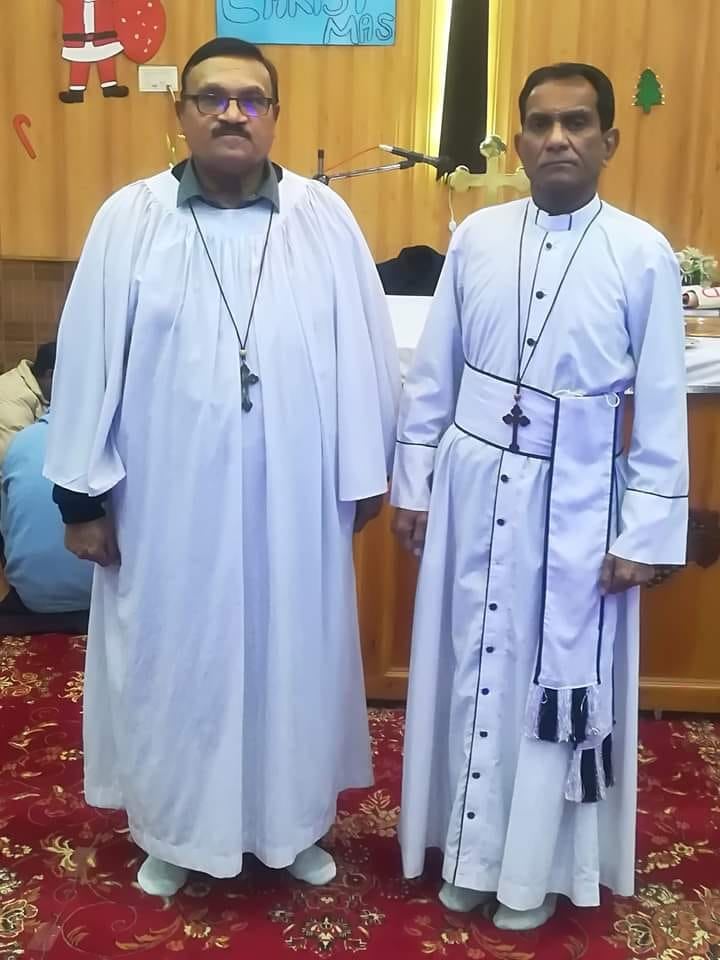Source: www.worldwatchmonitor.org
Date: February 1, 2022
 https://www.worldwatchmonitor.org/wp-content/uploads/2022/02/Rev.-William-Siraj-l-225x300.jpg 225w, https://www.worldwatchmonitor.org/wp-content/uploads/2022/02/Rev.-William-Siraj-l-41x55.jpg 41w, https://www.worldwatchmonitor.org/wp-content/uploads/2022/02/Rev.-William-Siraj-l-338x450.jpg 338w, https://www.worldwatchmonitor.org/wp-content/uploads/2022/02/Rev.-William-Siraj-l-675x900.jpg 675w" alt="" width="360" height="480" class="wp-image-38921 entered lazyloaded" data-lazy-srcset="https://www.worldwatchmonitor.org/wp-content/uploads/2022/02/Rev.-William-Siraj-l.jpg 720w, https://www.worldwatchmonitor.org/wp-content/uploads/2022/02/Rev.-William-Siraj-l-225x300.jpg 225w, https://www.worldwatchmonitor.org/wp-content/uploads/2022/02/Rev.-William-Siraj-l-41x55.jpg 41w, https://www.worldwatchmonitor.org/wp-content/uploads/2022/02/Rev.-William-Siraj-l-338x450.jpg 338w, https://www.worldwatchmonitor.org/wp-content/uploads/2022/02/Rev.-William-Siraj-l-675x900.jpg 675w" data-lazy-sizes="(max-width: 360px) 100vw, 360px" data-lazy-src="https://www.worldwatchmonitor.org/wp-content/uploads/2022/02/Rev.-William-Siraj-l.jpg" data-ll-status="loaded" />
https://www.worldwatchmonitor.org/wp-content/uploads/2022/02/Rev.-William-Siraj-l-225x300.jpg 225w, https://www.worldwatchmonitor.org/wp-content/uploads/2022/02/Rev.-William-Siraj-l-41x55.jpg 41w, https://www.worldwatchmonitor.org/wp-content/uploads/2022/02/Rev.-William-Siraj-l-338x450.jpg 338w, https://www.worldwatchmonitor.org/wp-content/uploads/2022/02/Rev.-William-Siraj-l-675x900.jpg 675w" alt="" width="360" height="480" class="wp-image-38921 entered lazyloaded" data-lazy-srcset="https://www.worldwatchmonitor.org/wp-content/uploads/2022/02/Rev.-William-Siraj-l.jpg 720w, https://www.worldwatchmonitor.org/wp-content/uploads/2022/02/Rev.-William-Siraj-l-225x300.jpg 225w, https://www.worldwatchmonitor.org/wp-content/uploads/2022/02/Rev.-William-Siraj-l-41x55.jpg 41w, https://www.worldwatchmonitor.org/wp-content/uploads/2022/02/Rev.-William-Siraj-l-338x450.jpg 338w, https://www.worldwatchmonitor.org/wp-content/uploads/2022/02/Rev.-William-Siraj-l-675x900.jpg 675w" data-lazy-sizes="(max-width: 360px) 100vw, 360px" data-lazy-src="https://www.worldwatchmonitor.org/wp-content/uploads/2022/02/Rev.-William-Siraj-l.jpg" data-ll-status="loaded" />A Pakistani pastor was killed and another wounded Sunday in an attack outside their church in northwestern Peshawar.
The two pastors were leaving the Shaheedan-e- all Saints’ Church where they had led the Sunday morning service when two men on a motorbike drove up to their car. They shot Rev. William Siraj in the head, killing him on the spot. His colleague, Rev. Patrick Naeem, was injured and taken to a nearby hospital for treatment.
No-one has yet claimed responsibility for the attack and a man-hunt for the two assassins is under way.
The attack took place outside a church that was established in memory of the twin suicide bombing of the All Saints’ Church in September 2013, in which 127 church members were killed and more than 250 injured. An offshoot of Tehreek-e-Taliban Pakistan, or TTP, a Pakistani branch of the Taliban, claimed responsibility for the bombing.
Among those who died that day was the son-in-law of Rev. Siraj, who was killed yesterday. He had, since then, lived with and supported his widowed daughter. “He was a very humble and godly man, and we all respected and loved him. He loved us so much,” a visibly emotional church member told World Watch Monitor.
TV footage showed people carrying Siraj’s body from the car to a nearby house while chanting “Long live Jesus Christ”, according to Reuters.
‘Deliberate and planned’
The leader of the Church of Pakistan, a union of protestant churches in the country, Bishop Azad Marshall, condemned the killings in a tweet, calling for “justice and protection of Christians from the government of Pakistan”.
In a statement, the Human Rights Commission of Pakistan’s chairperson, Hina Jilani, also demanded more steps for the protection of Christians and other minorities in Pakistan “whose right to life and security of person remains under constant threat,” she was quoted as saying by the Associated Press.
Although there had been no threats made to priests or the church in advance of Sunday’s attack, the way in which it was carried out “suggests a deliberate and planned attack; an act designed to intimidate, challenge and threaten those who offer rights, protection and freedoms to Christian minorities in Pakistan,” a local source, who wished to remain anonymous for security reasons, told WWM.
Attacks on Christian leaders, churches and individuals are nothing new in majority-Muslim Pakistan. The 2% minority faces religious freedom violations on several levels, from discrimination in education and the workplace to violent attacks.
The country’s blasphemy law is a tool that is regularly used, often to settle scores between individuals. The law is politically volatile as illustrated by threats and nationwide protests during the court case against Asia Bibi, the Catholic woman who was acquitted of blasphemy in 2019.
Increase in pressure after fall of Kabul
Peshawar is close to the border with Afghanistan, and since August the region has seen an uptick in attacks by the TTP, clearly emboldened by the Taliban’s takeover of Afghanistan, as reported by France24.
The withdrawal of US troops from Afghanistan also caused an exodus of refugees, hoping to find safety in neighbouring countries such as Pakistan. “We have seen thousands of refugees coming to major Pakistani cities such as Peshawar and Quetta,” said a local source, who also wished to remain anonymous for security reasons. “The cities are unable to cope with such an influx and people are facing not just inflation, but homelessness and starvation also. Unfortunately, we have seen an increase in assassination attempts, families in Christian neighbourhoods who are being shot at, forced conversions and bombings. Today [Sunday, Jan. 30] was yet another example of this brand of violence.”
Pakistan is 8th on the Open Doors World Watch List of 50 countries where it is most difficult to live as a Christian but as far as local Christians are concerned, it might as well be topping the list together owing to its proximity to Afghanistan, which is No. 1. This country rose to first place for the first time after having been in 2nd position after North Korea for many years.
“Pakistan’s religious landscape and the social degeneration that is taking place, cannot be isolated and distracted from that of Afghanistan,” the local source said. “Pakistan might show a moderate face; its heart is increasingly extremist and it wants to embrace a form of Islam where the Madrassa [Islamic school] is the way to get educated, with the Quran as the ultimate textbook.” In recent months the government has ordered public schools to implement religion-centred changes such as making afternoon prayers mandatory and reciting the Quran during morning assemblies.
Following the 2013 bombings, in June 2014, Pakistan’s supreme court issued a list of instructions for the government to protect the country’s minorities, including the development of “appropriate curricula for primary, secondary and tertiary levels of education that promote religious harmony and tolerance.” However, 2020 research by the Lahore-based Centre for Social Justice showed that religious minorities continued to be either invisible or vilified in Pakistan’s school textbooks.
“Where does this leave minority children?” the local source said. “The simple answer is this: in a queue for a visa, waiting to leave Pakistan and find hope and a future in a foreign land.”
